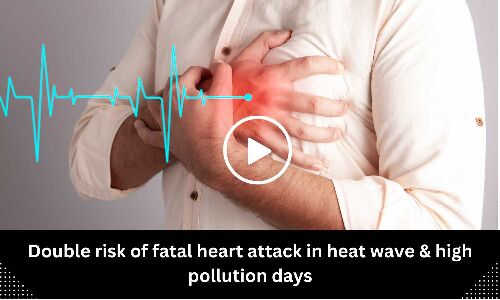Double risk of fatal heart attack in heat wave & high pollution days

The combination of soaring heat and smothering fine particulate pollution may double the risk of heart attack death, according to a new study of more than 202,000 heart attack deaths in China.To examine the impact of extreme temperatures with and without high levels of fine particulate pollution, the researchers analyzed 202,678 heart attack deaths between 2015-2020 that occurred in Jiangsu province, a region with four distinct seasons and a wide range of temperatures and fine particulate pollution levels.
Compared with control days, the risk of a fatal heart attack was observed at the following levels:
18% higher during 2-day heat waves with heat indexes at or above the 90th percentile increasing with temperature and duration, and was 74% higher during 4-day heat waves with heat indexes at or above the 97.5th percentile.
4% higher during 2-day cold snaps with temperatures at or below the 10th percentile, increasing with lower temperatures and duration, and was 12% higher during 3-day cold snaps with temperatures at or below the 2.5th percentile. Twice as high during 4-day heat waves that had fine particulate pollution above 37.5 micrograms per cubic meter.
Generally higher among women than men during heat waves. Higher among people ages 80 and older than in younger adults during heat waves, cold snaps or days with high levels of fine particulate pollution.
The researchers estimated that up to 2.8% of heart attack deaths may be attributed to the combination of extreme temperatures and high levels of fine particulate pollution, according to WHO targets.
Reference: Circulation, DOI 10.1161/CIRCULATIONAHA.122.063504
from Medical News, Health News Latest, Medical News Today - Medical Dialogues | https://ift.tt/i12kgKh
Comments
Post a Comment